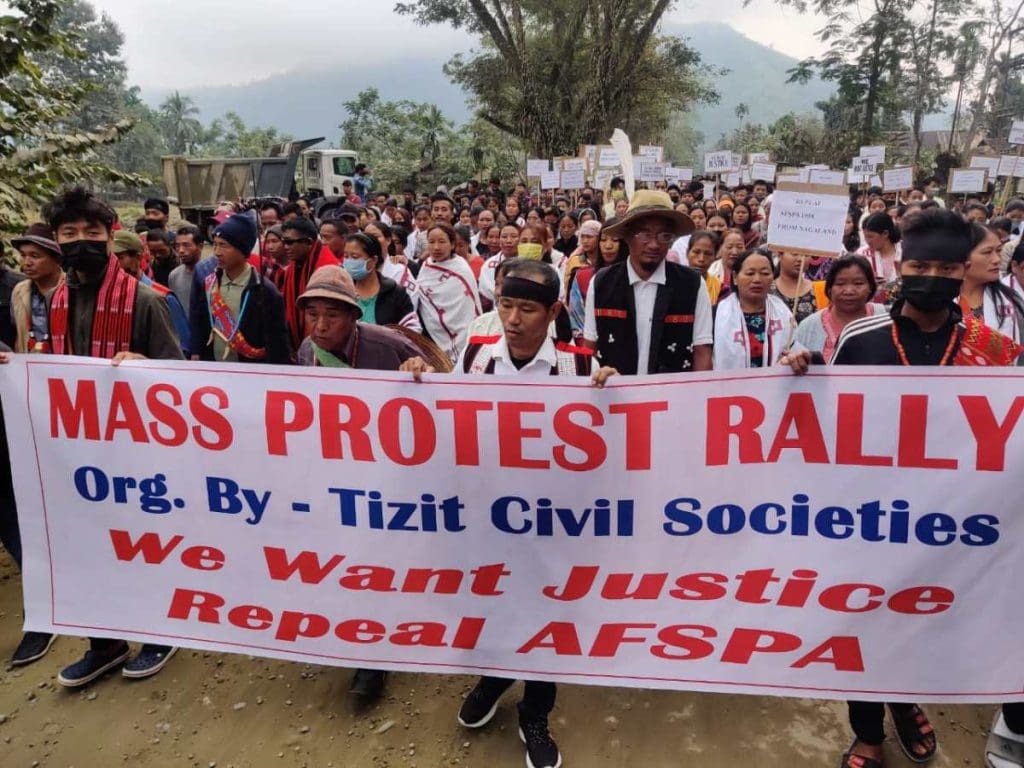
Several political groups and civil society collectives of Nagaland spoke against the decision of the Ministry of Home Affairs to extend the draconian AFSPA for another six months in the northeast state.
The Union government on Thursday declared the entire Nagaland as a “disturbed area” and extended Armed Forces (Special Powers) Act for another six months. This comes days after the Nagaland Legislative Assembly convened a special one-day session on 20 December to deliberate on AFSPA and the house had unanimously resolved to demand its repeal.
According to Naga People’s Front (NPF), the extension is a manifestation of the utter disregard the Union government has for the voices of small states, particularly in North East India.
“This extension is an immediate aftermath of the December 23 meeting convened by Union Home Minister Amit Shah with Nagaland Chief Minister Neiphiu Rio and Assam Chief Minister Dr. Himanta Biswa Sarma that also included Deputy Chief Minister Y Patton and the leader of the NPF legislature TR Zeliang wherein the Centre instituted a committee to examine the withdrawal of the AFSPA in Nagaland, is a case of further insult to injury,” read NPF’s statement.
Naga People’s Front (NPF) who supports the NDPP-BJP led state government, warned that it shall continue to pursue all democratic means to protest AFSPA.
Konyak Civil Society Organisations (CSOs), a prominent tribal body in the state alleged the extension of AFSPA in Nagaland is a violation of human rights.
Konyak CSOs’ statement reads: “The declaration for extension of AFSPA is a calculated sign that undermines human dignity and value while the Konyaks are crying for justice. Tagging the region as disturbed when its people have totally denounced any forms violence and was yearning for peace. The integrity of the nation cannot be achieved without people’s support and confidence.”
“The Konyak CSOs stand by the demands that had been placed in its 4 point chartered of demand. Accordingly it had resolved to place its entire faith and responsibilities upon the state government in voicing/bringing justice as demanded by the people. Improvement or deterioration of the current/prevailing situation solely lies upon the seriousness of the state government,” read the statement.
The most influential students’ body of Nagaland, Naga Students’ Federation (NSF) opposed the Union’s decision to extend AFSPA and said that it is an insult to Nagas at this time of grief.
“It is another attempt to rub in more salt to the already hurtful wounds caused by the botched army operations at Oting. Going by the adamant attitude of the GOI, the Naga people must be prepared to face them head-on this New Year. The NSF outrightly rejects the notification and the state government should also do so based on the resolution adopted at the recently concluded Special session of Nagaland Legislative Assembly,” India Today quotes NSF president Kegwayhun Tep and general secretary Siipuni Ng Philo as saying.
These developments come a month after the cold-blood murder of 13 civilians by the Indian Army in Nagaland.
The AFSPA gives armed forces deployed in internal conflicts broad powers to use lethal force and provides soldiers with effective immunity from prosecution.
Following the killings, the chief ministers of Nagaland and neighboring Meghalaya state, both allied to the Bharatiya Janata Party-led Union government, called for the repeal of AFSPA, as did opposition politicians, human rights activists, and affected residents.
The AFSPA, enacted in 1958 as a short-term measure to allow deployment of the army to counter an armed separatist movement in the Naga Hills, has now been in force for over 60 years. In addition to Nagaland, it is currently used in Manipur, Assam, and parts of Arunachal Pradesh and Jammu and Kashmir.
The AFSPA gives the armed forces wide powers to shoot to kill, make arrests on flimsy pretexts, conduct warrantless searches, and demolish structures in the name of “aiding civil power,” Human Rights Watch said.
The powers that the law extends to the armed forces come into force once an area subject to the act has been declared “disturbed” by the Union or state government. This declaration is not subject to judicial review.
Several reports of human rights groups found that equipped with these special powers, soldiers have raped, tortured, forcibly disappeared, and killed people without fear of being held accountable in these regions.
The act violates international human rights law protections, including the right to life, the right to be protected from arbitrary arrest and detention, and the right to be free from torture and cruel, inhuman, or degrading treatment. It also denies the victims and their families the right to a remedy.
Several government-appointed commissions in India have recommended repealing the law. Several United Nations human rights bodies have also called for the repeal of the law. A 2019 report on Jammu and Kashmir by the Office of the United Nations High Commissioner for Human Rights noted that the AFSPA “remains a key obstacle to accountability.”



